UK paying experts to build Islamic State war crimes case
- Published
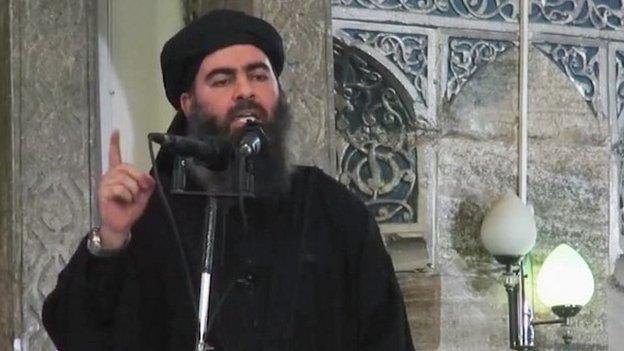
Abu Bakr al-Baghdadi, the leader of Islamic State group, delivered a sermon in Mosul, Iraq, in early July
A team of international investigators funded by the British government is compiling evidence against Islamic State fighters carrying out atrocities in Iraq and Syria, the BBC has learned.
They have spent months preparing up to 400 prosecution-ready files on the group's senior leaders and fighters.
Internal IS documents acquired by the team show "command responsibility" for numerous atrocities.
The group has taken over swathes of Iraq and Syria in recent months.
Working in strict secrecy, the team of experts has spent all year actively investigating commanders, emirs and provincial governors for war crimes and crimes against humanity.
The atrocities alleged to have been committed by those in their ranks include kidnappings, beheadings, crucifixions, torture and summary executions.
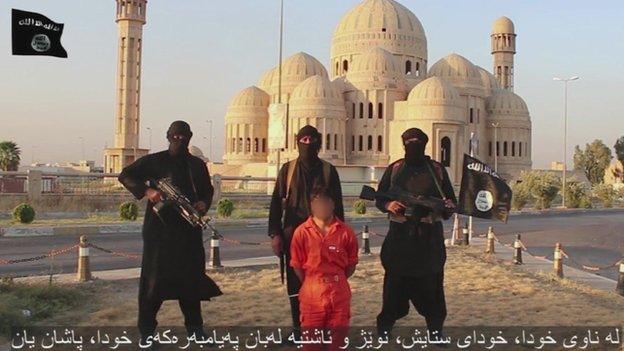
The group has published several videos online of its fighters beheading people in Iraq and Syria
On Wednesday, President Barack Obama vowed to destroy the group after it released a video showing the beheading of American journalist Steven Sotloff.
The group has carried out several more beheadings, including that of another US journalist, James Foley, and Kurdish fighters.
Mr Obama's comments came as campaign group Human Rights Watch said it had uncovered new sites of Islamic State mass killings in the Iraqi city of Tikrit.
The militants are believed to have murdered more than 500 Iraqi soldiers after taking over a large Iraqi army base in June.
Building a case against IS
The highly experienced war crimes investigators, working out of a nondescript headquarters in a European city, have avoided all publicity until now.
But in an interview with the BBC, they revealed that they were being funded by the UK Government to the tune of $70,000 (£43,000) a month and employ sources both in Syria and in the neighbouring countries.
"We would like to see the murderers of James Foley brought to justice," the chief investigator told the BBC. "Having said that, those particular offenders and others like them are not the focus of our investigations."
"What we are after are the highest-level members of IS because these individuals are just as responsible for the countless murders as those men who kill with their own hands," he added.
"Indeed, those leaders are more responsible because they don't kill one person or two people. They are responsible for all the killings."
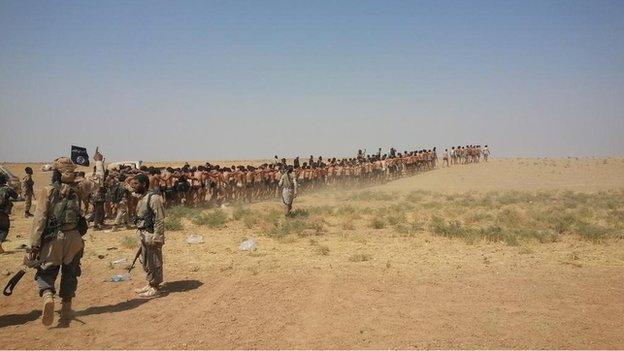
Last week, IS posted images online that appeared to show dozens of Syrian soldiers being executed
The team has boxes of evidence smuggled out of Syria, consisting of documents, memory sticks and witness testimonies.
They even have the actual minutes of an Islamic State provincial meeting that goes into such detail as forbidding their guards in Aleppo province to sleep in after 07:30.
The investigators have managed to build up an intricate picture of how IS is run, with Abu Bakr al-Baghdadi, the self-appointed caliph, at the top.
Directly beneath him are four advisory councils: Sharia (Islamic Law), Shura, Military and Security, with the latter two being the most powerful.
This one-plus-four structure is then duplicated down the chain of command, right down to local level.

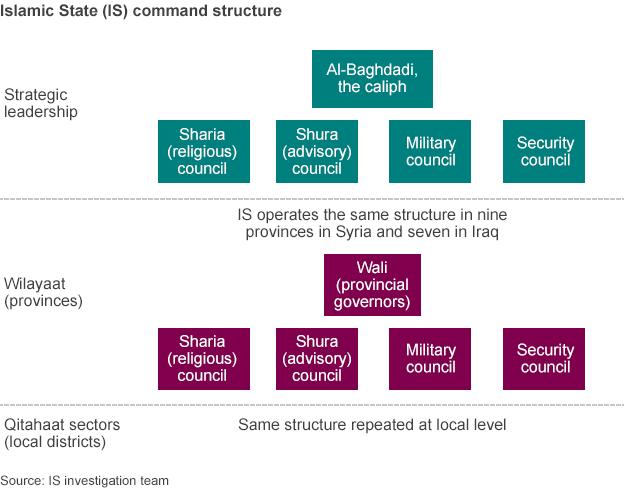
According to investigators IS operates a "one-plus-four" command structure in Syria and Iraq. From Al-Baghdadi at the top, down to provincial and district levels, IS is headed by a leader and four councils.

The investigators' command structure document is available as a download:

The team say the number of foreign recruits to IS has surged since it declared itself a caliphate in the summer, with estimates of their total strength having been revised upwards from around 10,000 to near 30,000.
There is a wide diversity in capability, the team says, with Tunisians and Chechens being among the most valued footsoldiers for their aggression and experience on the battlefield.
British recruits
With a few exceptions, investigators believe that British jihadists tend to cross the border from Turkey into Syria with no military experience and very little religious knowledge.
After three months in a safe house getting basic military training and indoctrination, they are assigned tasks and roles.
"By and large the Westerners are given menial or low-level tasking by the emirs [the commanders]," said another of the investigators, "because they tend to arrive with no discernable battlefield skills.
"So its assumed they're better off providing support services to the group as they are unlikely to have either the religious or military expertise IS is looking for," he added.

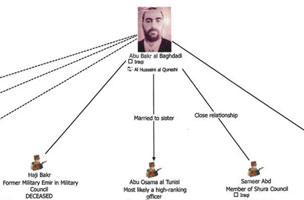
The investigators have put together a diagram showing links between al-Baghdadi and some named individuals.

Despite their apparent role in the recent murders of the two American journalists, no British jihadists are thought to have reached any senior positions within Islamic State.
Around half the estimated 500-600 who have travelled to Syria are now thought to be back in the UK.
The team has reached the conclusion that IS is a far more structured and disciplined organisation than was previously thought.
"Our breakthrough came maybe two or three months ago when we looked at all the evidence that we'd gathered to date," the chief investigator told the BBC.
"We realised what we were looking at was not a militant organisation, we were witnessing the process of nation-building."
"That includes the provision of services, looking after the population - there is a military element of course but IS is just what it says, it is not a one-off phenomenon. They are building an Islamic state in the desert."
The investigators say they expect some of their most important case files to be complete by the end of this year.
But the team admits that bringing any of the suspects to trial will be almost impossible at present because they are hard to find and well protected.
There is also the problem of legal jurisdiction as the team's remit runs only to Syria, not Iraq, and they say there is, at present, no court yet ready to try them.